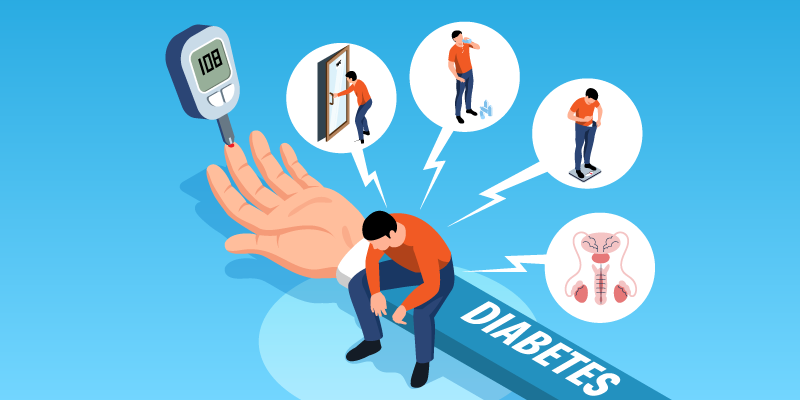Diabetes, a chronic metabolic disorder, has emerged as a global health concern affecting millions of lives. Characterized by elevated blood glucose levels, this condition demands vigilant management to prevent complications and improve overall well-being. While there is no cure for diabetes, there are numerous solutions available to effectively manage and control the disease. In this blog, we will delve into various aspects of diabetes and explore holistic approaches, lifestyle modifications, and medical interventions that contribute to a comprehensive solution for diabetes.
Contents
What is Diabetes?

Diabetes is a chronic metabolic disorder characterized by elevated levels of blood glucose (or blood sugar) over a prolonged period. This condition arises when the body either does not produce enough insulin or cannot effectively use the insulin it produces. Insulin is a hormone produced by the pancreas that plays a crucial role in regulating blood sugar levels.
There are several types of diabetes, but the two main categories are Type 1 diabetes and Type 2 diabetes:
Type 1 Diabetes:
- Cause: Type 1 diabetes is an autoimmune condition where the body’s immune system mistakenly attacks and destroys the insulin-producing beta cells in the pancreas. The exact cause of this autoimmune response is not fully understood, but genetic and environmental factors are believed to contribute.
- Onset: Typically diagnosed in children and young adults.
- Insulin Dependency: Individuals with Type 1 diabetes require lifelong insulin therapy because their bodies no longer produce insulin.
Type 2 Diabetes:
- Cause: Type 2 diabetes is often associated with insulin resistance, where the body’s cells do not respond effectively to insulin. As a result, the pancreas produces more insulin to compensate, but over time, it may not be able to produce enough insulin to maintain normal blood sugar levels.
- Onset: More commonly diagnosed in adults, but it can occur at any age.
- Insulin Production and Resistance: While insulin resistance is a key feature, Type 2 diabetes can involve both insufficient insulin production and resistance to insulin’s effects.
- Risk Factors: Lifestyle factors such as a sedentary lifestyle, poor diet, obesity, and genetic predisposition can contribute to the development of Type 2 diabetes.
List of Different Solutions for Diabetes
The management of diabetes involves a combination of lifestyle modifications, medications, and, in some cases, medical devices. Here is a list of different solutions for diabetes:
1. Insulin Therapy

Insulin therapy is a cornerstone in the management of diabetes, especially for individuals with Type 1 diabetes and some with Type 2 diabetes.
Also, Insulin, a hormone produced by the pancreas, plays a vital role in regulating blood sugar levels.
- In Type 1 diabetes, the immune system mistakenly attacks and destroys the insulin-producing cells, necessitating external insulin.
- Additionally, some individuals with Type 2 diabetes may eventually require insulin if other medications prove insufficient.
There are various types of insulin, each with distinct characteristics.
- Rapid-acting insulin starts working quickly and is taken just before or after meals to control postprandial spikes in blood sugar.
- Short-acting insulin has a slightly slower onset and is typically taken before meals.
- Intermediate-acting and long-acting insulin provide more extended and consistent blood sugar control throughout the day and night.
The administration of insulin can be through injections using syringes, insulin pens, or insulin pumps.
Advances in technology, such as continuous glucose monitoring (CGM) systems, have improved the precision of insulin delivery, allowing for more personalized and effective diabetes management.
2. Oral Medications
Oral medications are a key component in the arsenal against Type 2 diabetes, offering diverse options to address different aspects of the condition. These medications aim to improve insulin sensitivity, reduce glucose production in the liver, and enhance the effectiveness of insulin in the body.
Metformin, a widely prescribed medication, belongs to the biguanide class and helps lower blood sugar by reducing the amount of glucose produced by the liver. It is often the first-line treatment for Type 2 diabetes and is known for its safety and efficacy.
Sulfonylureas, another class of oral medications, stimulates the pancreas to release more insulin. While effective, they may cause hypoglycemia (low blood sugar) and are often used when other medications prove insufficient.
Dipeptidyl Peptidase-4 (DPP-4) Inhibitors enhance insulin production and reduce glucose production. They are well-tolerated and can be used alone or in combination with other medications.
Other classes of medications include Thiazolidinediones (TZDs), which improve insulin sensitivity, and Sodium-Glucose Co-Transporter 2 (SGLT2) Inhibitors, which promote the excretion of glucose through urine.
The choice of medication depends on factors such as individual health, coexisting conditions, and potential side effects. Regular monitoring of blood sugar levels and collaboration with healthcare providers is crucial for optimizing oral medication therapy and achieving targeted glycemic control.
3. Continuous Glucose Monitoring (CGM) Systems
Continuous Glucose Monitoring (CGM) systems represent a revolutionary advancement in diabetes care, providing real-time data on blood sugar levels. Unlike traditional blood glucose monitoring, which involves periodic fingerstick tests, CGM systems offer continuous, 24/7 monitoring, offering a more comprehensive picture of glucose fluctuations.
A CGM system typically consists of a tiny sensor inserted under the skin, measuring glucose levels in the interstitial fluid.
The sensor sends this data to a receiver or a smartphone, providing real-time information about current glucose levels, trends, and potential impending highs or lows.
The benefits of CGM include
- improved glycemic control
- enhanced awareness of glucose patterns
- ability to make immediate adjustments to treatment plans.
Users can set alerts for high and low glucose levels, preventing severe fluctuations and reducing the risk of complications.
CGM technology is particularly valuable for individuals with variable glucose levels, such as those with Type 1 diabetes. It empowers users to make informed decisions about food choices, exercise, and medication adjustments, leading to better overall diabetes management and improved quality of life.
4. Lifestyle Modifications

Lifestyle modifications play a pivotal role in managing diabetes and can significantly impact blood sugar control. These modifications encompass dietary changes, regular physical activity, stress management, and adequate sleep. Adopting a holistic approach can empower individuals to take control of their health and mitigate the impact of diabetes on their daily lives.
Balanced Diet: Emphasizing whole foods, such as fruits, vegetables, whole grains, and lean proteins, is essential. Carbohydrate counting and portion control help regulate blood sugar levels. Working with a registered dietitian can provide personalized guidance on meal planning.
Regular Physical Activity: Exercise improves insulin sensitivity, helps with weight management, and contributes to overall well-being. A combination of aerobic exercises, strength training, and flexibility exercises is recommended. Establishing a consistent exercise routine is key to long-term success.
Stress Management: Chronic stress can elevate blood sugar levels. Incorporating stress-management techniques such as mindfulness, meditation, or yoga into daily life can promote emotional well-being and contribute to better diabetes control.
Adequate Sleep: Inadequate sleep can negatively impact blood sugar levels and insulin sensitivity. Prioritizing good sleep hygiene habits, aiming for 7-9 hours of quality sleep per night, supports overall health and diabetes management.
By integrating these lifestyle modifications into daily routines, individuals with diabetes can positively impact their blood sugar levels, reduce the risk of complications, and enhance their overall quality of life.
5. Supportive Community
Living with diabetes can be challenging, both physically and emotionally. Engaging with a supportive community, either in-person or online, can provide a valuable source of encouragement, shared experiences, and practical tips for managing the condition effectively.
Emotional Support: Connecting with others who understand the daily challenges of diabetes can offer emotional support and reduce feelings of isolation. Support groups, both local and online, create a space for individuals to share their journeys, successes, and concerns.
Information Exchange: Being part of a community allows for the exchange of valuable information and insights into effective diabetes management. Individuals can learn about new technologies, treatment options, and lifestyle strategies that have worked for others.
Motivation and Accountability: A supportive community can serve as a source of motivation, encouraging individuals to stay committed to their treatment plans, make healthy choices, and prioritize self-care. Accountability within the community fosters a sense of responsibility for one’s health.
Advocacy and Education: Communities often engage in advocacy efforts and educational initiatives, raising awareness about diabetes, dispelling myths, and promoting a more informed and empathetic society. This collective approach contributes to reducing stigma and fostering understanding.
In conclusion, being part of a supportive community can have a profound impact on the journey of managing diabetes. It provides a sense of belonging, encouragement, and shared knowledge that empowers individuals to navigate the challenges of diabetes with resilience and determination.
How To Seek Solutions for Diabetes?

When seeking solutions for diabetes online, numerous reputable websites provide valuable information, resources, and tools for individuals looking to manage their condition effectively. Here is a list of online websites that offer reliable guidance on diabetes:
- Diabetes Mantra: Diabetes Mantra is an online community that offers articles, forums, and resources for people living with diabetes. It covers a broad range of topics, including nutrition, fitness, and emotional well-being.
- Joslin Diabetes Center: A renowned diabetes research and treatment center, Joslin Diabetes Center’s website offers comprehensive information on diabetes care, research updates, and educational materials. They also provide resources for living with diabetes and support services.
- Mayo Clinic: Mayo Clinic’s website features in-depth articles on diabetes, covering topics such as symptoms, causes, diagnosis, and treatment options. It is a reliable source for understanding the medical aspects of diabetes.
- CDC Diabetes: The Centers for Disease Control and Prevention (CDC) provides a dedicated section on diabetes, offering statistics, prevention tips, and resources for managing diabetes. The website is particularly valuable for public health perspectives on diabetes.
- National Institute of Diabetes and Digestive and Kidney Diseases (NIDDK): As part of the National Institutes of Health (NIH), NIDDK’s website covers a wide range of diabetes-related topics, including research updates, treatment options, and lifestyle recommendations. It is a reliable source of evidence-based information.

